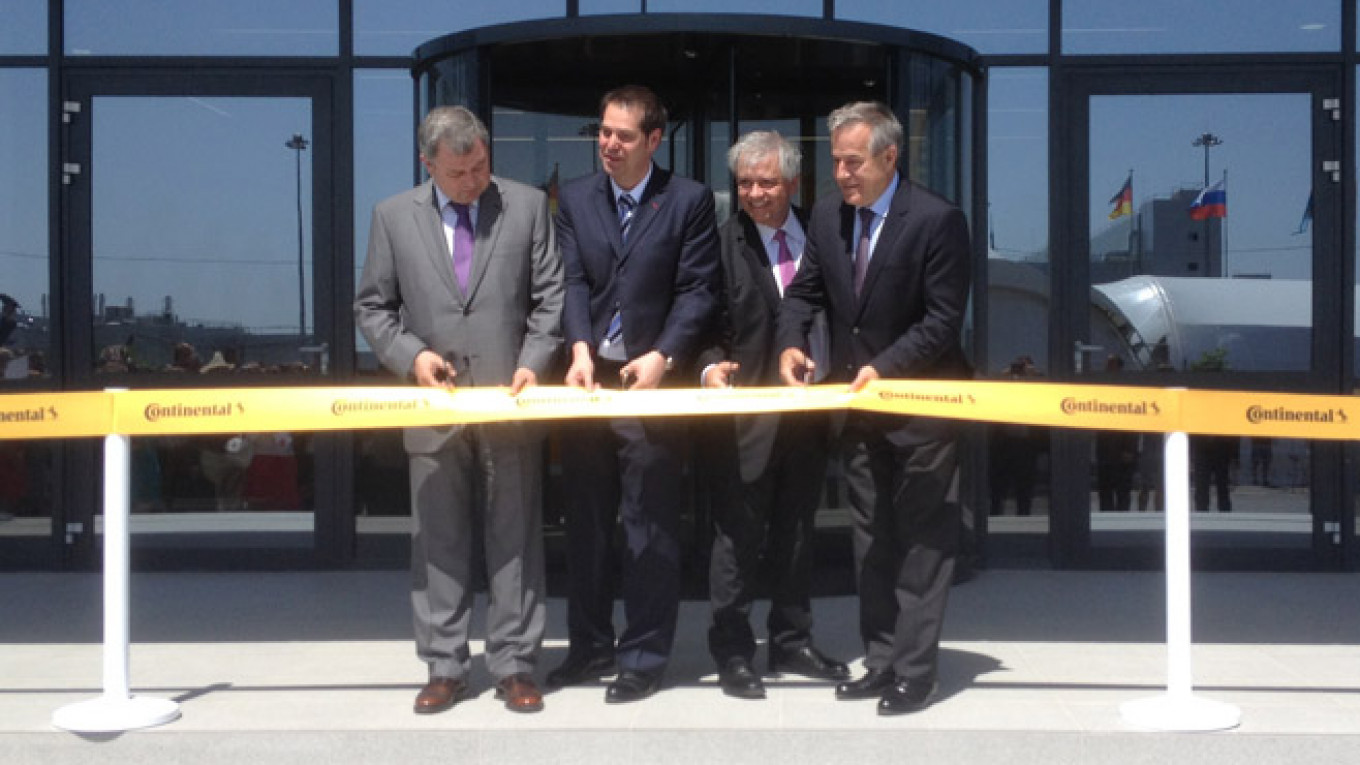As pundits and politicians lament the deceleration of the Russian economy, no one seems to have told investors and officials in Kaluga that things are supposed to be going badly.
In fact, Kaluga Governor Anatoly Artamonov boasted that the region is still experiencing "Chinese" growth levels during a ribbon-cutting ceremony held Thursday for a high-tech engine component manufacturing plant opened by Germany's Continental AG.
Just a 2 1/2-hour drive southwest of Moscow, Kaluga is part of the Russian heartland — a mostly dreamy, quiet place with ungodly roads and rundown architecture.
But the M3 federal highway is uncannily smooth by Russian standards, and, while still lined up by plenty of decrepit buildings and trees of Sherwood Forest proportions, also features a thriving economy.
Roadside cafes bear such drool-inducing names as "More Meat," trucks zip busily by flashing epic company logos like "The Chicken Kingdom," and, in a sign of middle-class prosperity that would warm any businessman's heart, surfers leisurely cruise waters in Kaluga's Cable Park by the M3 — an "investor road," if there ever was one.
Kaluga has nine industrial parks, reflecting its status as an investor's paradise in Russia. The engine components plant is the latest addition to the Kaluga South one, where it sits right next to a Volvo factory.
"We are real glad to have this beauty of a factory here," Artamonov said at the plant's opening ceremony, motioning toward the factory building behind him, a cuboid of immaculate gray.
Continental pumped 24 million euros ($32.5 million) into the plant, one-tenth of its total investment in Russia, Jose Avila, head of the company's Powertrain division, said at the ribbon-cutting ceremony.
The plant is expected to crank up 1 million engine control units, 500,000 fuel control units and 500,000 fuel rail systems a year, according to the German conglomerate, which also has a tire plant in Kaluga.
This would be enough to supply every second automobile manufactured in Russia — but in a hint that economic forecasts may, after all, not be cloudless, Continental execs were careful about the factory's prospects, dodging questions about prospective clients and a tentative expansion.
"We have the provision — the plant's foundation is designed to allow expansion," Avila, who is also a Continental board member, said at the press conference in Kaluga on Thursday.
"But before we talk about new investment, we need to feel and utilize existing ones," he said.
The plant currently operates at limited capacity. The production room is more than half empty, which makes it look like a cross between a squash court and a Skynet production facility from "Terminator 2: Judgment Day," only staffed exclusively by homely, middle-aged Russian women more often seen working as clerks or manning kiosks in provincial grocery stores.
The women have looks of relaxed concentration and operate with robotic precision. "Men cannot do these jobs," a female reporter on the press tour crowd claims.
"It is also said men do not want these jobs," bristles the otherwise timid male employee leading the tour, who then quickly ushers the group to check out another piece of machinery, ending the brewing battle of the sexes.
So far, the factory has only added 100 jobs in Kaluga, but plans to employ another 220 workers by 2016.
In any case, every little bit helps. This philosophy has helped to propel Kaluga to place among the top Russian regions in many investment polls.
Since coming to power in 2000, Artamonov, a local peasant's son, has been pulling out all the stops to make life easier for investors by offering tax breaks and reigning in bureaucracy, the scourge of Russian business climate.
The regional economy is not perfect. The downside of Artamonov's focus of luring investors in without milking them is seen in the fact that the region's debt is large and getting larger.
But the governor remains optimistic to the point of false modesty.
"We have trimmed our [regional] growth forecast a bit to 7.5 percent this year, but we look to meet it despite the slow growth of the global economy," he told The Moscow Times on the sidelines of the ceremony. The median forecast for the Russian economy in general this year is zero growth.
The governor stuck around stoically until the end of the event, and could be seen brooding in the scorching sun outside the plant with a cigarette, removed from the press and the Continental execs chirping in English and German. Somewhere out there, GDP indicators were sliding.
Contact the author at [email protected]
A Message from The Moscow Times:
Dear readers,
We are facing unprecedented challenges. Russia's Prosecutor General's Office has designated The Moscow Times as an "undesirable" organization, criminalizing our work and putting our staff at risk of prosecution. This follows our earlier unjust labeling as a "foreign agent."
These actions are direct attempts to silence independent journalism in Russia. The authorities claim our work "discredits the decisions of the Russian leadership." We see things differently: we strive to provide accurate, unbiased reporting on Russia.
We, the journalists of The Moscow Times, refuse to be silenced. But to continue our work, we need your help.
Your support, no matter how small, makes a world of difference. If you can, please support us monthly starting from just $2. It's quick to set up, and every contribution makes a significant impact.
By supporting The Moscow Times, you're defending open, independent journalism in the face of repression. Thank you for standing with us.
Remind me later.







